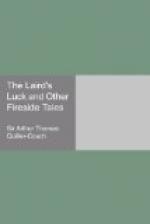Title: The Laird’s Luck
Author: Arthur Quiller-Couch
Release Date: July 17, 2004 [EBook #12923]
Language: English
Character set encoding: ASCII
*** Start of this project gutenberg EBOOK the Laird’s luck ***
Produced by Ted Garvin, Josephine Paolucci and the
Online Distributed
Proofreading Team.
THE LAIRD’S LUCK AND OTHER FIRESIDE TALES
By
A.T. Quiller-couch
(Q)
CHARLES SCRIBNER’S SONS NEW YORK 1901
THE LAIRD’S LUCK
[In a General Order issued from the Horse-Guards on New Year’s Day, 1836, His Majesty, King William IV., was pleased to direct, through the Commander-in-Chief, Lord Hill, that “with the view of doing the fullest justice to Regiments, as well as to Individuals who had distinguished themselves in action against the enemy,” an account of the services of every Regiment in the British Army should be published, under the supervision of the Adjutant General.
With fair promptitude this scheme was put in hand, under the editorship of Mr. Richard Cannon, Principal Clerk of the Adjutant General’s Office. The duty of examining, sifting, and preparing the records of that distinguished Regiment which I shall here call the Moray Highlanders (concealing its real name for reasons which the narrative will make apparent) fell to a certain Major Reginald Sparkes; who in the course of his researches came upon a number of pages in manuscript sealed under one cover and docketed “Memoranda concerning Ensign D.M.J. Mackenzie. J.R., Jan. 3rd, 1816”—the initials being those of Lieut.-Colonel Sir James Ross, who had commanded the 2nd Battalion of the Morays through the campaign of Waterloo. The cover also bore, in the same handwriting, the word “Private,” twice underlined.
Of the occurrences related in the enclosed papers—of the private ones, that is—it so happened that of the four eye-witnesses none survived at the date of Major Sparkes’ discovery. They had, moreover, so carefully taken their secret with them that the Regiment preserved not a rumour of it. Major Sparkes’ own commission was considerably more recent than the Waterloo year, and he at least had heard no whisper of the story. It lay outside the purpose of his inquiry, and he judiciously omitted it from his report. But the time is past when its publication might conceivably have been injurious; and with some alterations in the names—to carry out the disguise of the Regiment—it is here given. The reader will understand that I use the IPSISSIMA Verba of Colonel Ross.—Q.]




